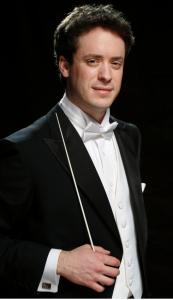
Volcano Brings Kuerti and Ngwenyama to Cincinnati
Could the ash cloud from Iceland's erupting Eyjafjallajökull have had a silver lining?

It may have for
Cincinnati, since it brought Julian Kuerti and Nokuthula Ngwenyama to town.
Kuerti, 33, guest
conductor with the Cincinnati Symphony Orchestra Friday morning (April 23) at Music Hall,
came on short notice to fill in for CSO music director Paavo Järvi, whose
flight from Frankfurt, Germany was canceled because of the eruption.
Violist Ngwenyama did the same for Dutch violist Isabelle van Keulen in Berlioz' "Harold in Italy." Van Keulen was unable to travel from London's Heathrow Airport.

Both made their CSO debuts.
Kuerti's debut was particularly auspicious. From the
first bars of Berlioz’ "Roman Carnival“ Overture, one thing was clear: This was no fill-in conductor. This young Canadian,
currently assistant conductor of the Boston Symphony under music director James
Levine, could be Järvi's successor. If there is already a short list for the post, he should be on it or at the very least, asked back soon.
Järvi, 47, music director of the CSO since 2001,
announced in January that he would not renew his contract when it expires at
the end of next season.
Kuerti made an instant impression in the "Roman Carnival" Overture, summoning a splash of strings, a shiver of
winds and a tattoo of trumpets -- all before before English hornist Christopher Philpotts
sounded the opening theme.
There was a continuity and rhythmic vitality throughout the
eight-and-a-half-minute work that kept listeners on the edge of their seats. Textures were transparent, ensemble was
precise and connections were so clean that one was instantly "into“ the next section of the music. The violas got the
juicy first full statement of the theme.
The program
included yet another Berlioz work, the Overture to his opera "Benvenuto
Cellini." Grand finale to the concert was a splashy, all-stops-pulled
performance of Respighi’s popular "Pines of Rome."
California native Ngwenyama is a rising star of the viola, larger and lower-voiced sister of the violin. Before the last century, solo works for viola were practically non-existent. As a result, violists rarely attained virtuoso status. Thus arose the “viola joke” (Q: How can you tell when a violist is out of tune? A: When the bow is moving.)
Berlioz’ “Harold in Italy,” loosely based on Lord Byron’s “Childe Harold’s Pilgrimage,” was, somewhat ironically, written for legendary violinist Niccolo Paganini. When Berlioz presented him with an orchestral work with a viola solo rather than a virtuoso showpiece, he refused to play it. Another violist (with a bit more modesty) premiered it, and it has become a centerpiece of the viola repertoire and one of the composer’s most popular works.
Ngwenyama, 33, who made her Cincinnati debut on a Cincinnati Chamber Orchestra “Schubertiade” in November, 2007, is a patrician artist who draws a pure, burnished sound from her instrument (by Santino Lavazza, 18th century Milan). She does it apparently effortlessly, without exaggerated movements or gratuitous showmanship. She could always be heard in the Berlioz -- a challenge for any soloist in over-sized Music Hall. In “Harold in Italy,” as Paganini ruefully noted, the viola is more a member of the orchestra than the center of attention, especially in the finale, “Orgy of the Brigands.”
When the viola is front and center, however, it is to great advantage and Berlioz makes the most of its character.
Kuerti was integral to the work's success, setting the stage vividly for each movement and attending carefully to balances with the viola. The first movement, “Harold in the Mountains” had just the right blend of brooding and nostalgia. Ngwenyama added a touch of sweetness to her opening statement, where she was sensitively accompanied by harpist Gillian Benet Sella, seated at the front of the orchestra as the composer specified.
The second movement, “Procession of Pilgrims Singing the Evening Hymn,” had even more viola color, with the orchestral violas playing a substantial role. The section marked Canto religioso was exquisite, the CSO winds and strings exchanging melodies accompanied by a halo of arpeggios by Ngwenyama.
The mood was lively
and cheerful in “Serenade of an Abruzzi Mountaineer to his Beloved,” where Ngwenyama
was evenly balanced against the CSO, whether in a solo or accompanimental role. The woodwinds shone here, including English hornist Philpotts, whose voice was heard frequently on the concert, having additional
important solos in “Roman Carnival” and the final movement of “Pines of Rome."
The sharp fortissimo that opened “The Brigand’s Orgies” startled many in the audience, coming after the soft ending of the “Serenade.” Berlioz’ tangled rhythms and sudden changes of tempo as music from the earlier movements was repeated created a bit of a minefield for the CSO, but the overall effect was exhilarating. A trio of strings was heard offstage in a last lovely recollection of the pilgrim’s song with Ngwenyama before Kuerti brought the work to a crashing conclusion.
(Seen at the concert were several retired CSO violists: Joseph Somogyi, Mark Cleghorn and Allen and Judith Martin.)
The second half opened with the “Benvenuto Cellini” Overture, a warm, melodious work with brilliant “Roman Carnival” moments and three timpanists playing simultaneously.
To end the concert, Kuerti and the CSO thrilled the audience with an extraordinary performance of Respighi’s blockbuster. The “Pines of the Villa Borghese” with its children’s games sparkled right out of the gate. The mischief-making grew deafening at the end, the final, “out-of-tune” trumpets topping off the fun before the bottom fell out of everything and the music slid almost noiselessly into “Pines Near a Catacomb.” The sound produced by the lower strings was deeply affecting, somewhere between mysterious and magisterial. A trumpet (Principal Robert Sullivan) drifted in from the foyer, a lonely, faraway effect easily achievable in the large hall. Organist Heather MacPhail joined the CSO as the chant melody built to soaring intensity.
“The Pines of the Janiculum” opened with ripples of piano (Michael Chertock). Principal clarinetist Richard Hawley’s solo was appropriately “dream-like” (the effect specified by the composer, as Hawley explained in the “Prelude” video shown before the concert). Kuerti, who is also a violinist, drew a sweeping, splendidly shaped melody from the violins in one of those conductorial moments that defies explanation. Suffice it to say that he personified the music, not in an exaggerated or pretentious way, but with broad strokes of the baton that seemed to compel the musicians to play accordingly. The movement ended super-softly, with the song of a nightingale piped gently over the music. One felt that there was a real bird was somewhere in the rafters.
Again, there was an immediate segue – into the soft tread of “The Pines of the Appian Way.” Six extra brass players entered the balcony stage left and added to the growing thunder. MacPhail returned to the organ console and one of classical music’s all-time Hollywood endings built to a relentless, pounding conclusion.
Repeats are 8 p.m. tonight (Saturday, April 24) and 3 p.m. Sunday at Music Hall. Sunday’s shortened program comprises “Harold in Italy” and “Pines of Rome" without intermission. The concert will be followed by an interactive, multimedia “talk-back” session with Kuerti and Ngwenyama. Tickets are available at (513) 381-3300, or online at www.musicincincinnati.com